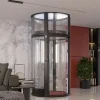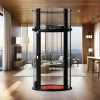Dubai, renowned for its stunning skyscrapers and innovative architectural designs, is at the forefront of adopting cutting-edge technologies in various sectors, including elevator installations. The city’s rapid urbanization and commitment to modernization have driven the demand for advanced elevator technologies that enhance efficiency, safety, and user experience. This article delves into the latest elevator installation innovations in Dubai, highlighting how these technologies are transforming the vertical transportation landscape.
Elevator Technology Advancements
- Smart Elevators: Smart elevators are revolutionizing the way people move within buildings. Equipped with advanced microprocessors and Internet of Things (IoT) capabilities, these elevators can:
- Predict Traffic Patterns: Use data analytics to predict and respond to passenger traffic, reducing wait times and improving efficiency.
- Personalize Experiences: Offer personalized services, such as calling the elevator to a specific floor based on user preferences or recognizing regular users.
- Remote Monitoring: Allow for remote monitoring and diagnostics, enabling quick identification and resolution of issues to minimize downtime.
- Destination Control Systems (DCS): Destination control systems are enhancing elevator efficiency by grouping passengers heading to the same or nearby floors. This technology:
- Optimizes Travel Routes: Reduces the number of stops and travel time by directing passengers to specific elevators based on their destination.
- Increases Efficiency: Significantly increases the overall efficiency and capacity of the elevator system, especially during peak hours.
- Regenerative Drives: Energy efficiency is a crucial consideration in modern elevator systems. Regenerative drives help achieve this by:
- Capturing Energy: Capturing the energy generated during the elevator’s descent and feeding it back into the building’s power grid.
- Reducing Energy Consumption: Lowering the overall energy consumption of the elevator system, contributing to sustainability and cost savings.
- Wireless Elevator Controls: Wireless technology is simplifying elevator installations and maintenance. Key benefits include:
- Ease of Installation: Reducing the need for extensive wiring and cabling, making installation quicker and less invasive.
- Flexibility: Offering greater flexibility in control panel placement and design, enhancing the aesthetic appeal of the elevator.
- Advanced Safety Features: Safety remains a top priority in elevator technology. Innovations in this area include:
- AI-Powered Monitoring: Using artificial intelligence to continuously monitor the elevator’s operation, detecting anomalies and potential issues before they become critical.
- Emergency Communication Systems: Enhanced communication systems that provide real-time updates and ensure passenger safety during emergencies.
Installation Innovations in Dubai
- Modular Elevator Systems: Modular elevators are gaining popularity in Dubai due to their efficiency and speed of installation. These systems are:
- Pre-Assembled: Delivered as pre-assembled modules that can be quickly installed on-site, reducing installation time and labor costs.
- Customizable: Highly customizable to fit the specific needs and architectural designs of different buildings.
- Advanced Material Usage: The use of advanced materials in elevator construction is improving durability and performance. Key materials include:
- Carbon Fiber Cables: Stronger and lighter than traditional steel cables, carbon fiber cables reduce the overall weight of the elevator system and increase energy efficiency.
- Composite Materials: Durable and lightweight composite materials enhance the structural integrity and longevity of the elevator components.
- Seamless Integration with Building Management Systems (BMS): Modern elevators in Dubai are designed to seamlessly integrate with building management systems, providing a cohesive approach to building operations. Benefits include:
- Centralized Control: Allowing building managers to monitor and control elevator operations from a central system.
- Enhanced Efficiency: Improving overall building efficiency by optimizing elevator usage based on real-time data and building occupancy levels.
Future Prospects
As Dubai continues to grow and innovate, the future of elevator technology looks promising. Emerging trends and potential future developments include:
- Autonomous Elevators: Elevators capable of operating autonomously, adapting to changing building dynamics and user needs.
- Augmented Reality Maintenance: Using augmented reality to assist technicians in maintenance and repairs, improving accuracy and reducing downtime.
- Green Elevators: Further advancements in eco-friendly technologies, such as solar-powered elevators and biodegradable materials, to promote sustainability.
Conclusion
Dubai’s commitment to embracing the latest elevator installation technologies is reshaping the city’s skyline and improving the quality of life for its residents and visitors. From smart elevators and destination control systems to regenerative drives and advanced safety features, these innovations are setting new standards in vertical transportation. As the city continues to evolve, the adoption of cutting-edge elevator technologies will play a crucial role in supporting its growth and maintaining its status as a global leader in modern architecture and urban development.








